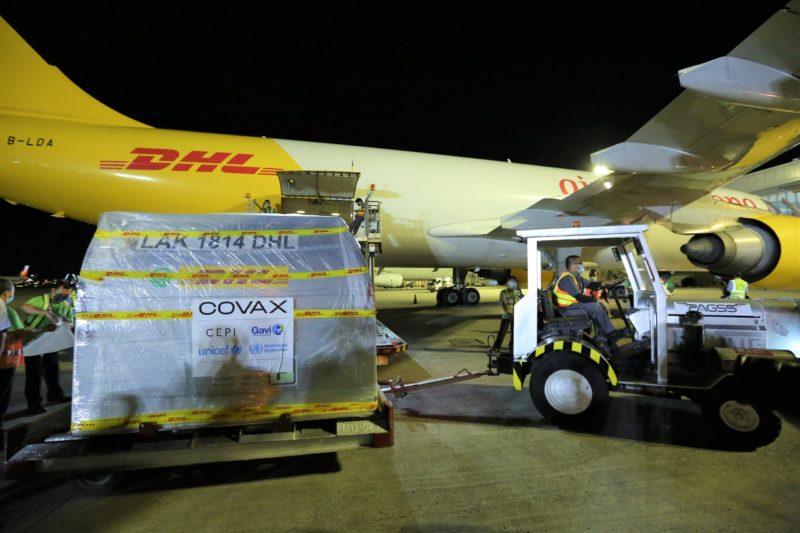
- DHL undertook on May 10 delivery of the first batch of Pfizer-BioNTech COVID-19 vaccines to the Philippines from Belgium
- Vaccines were delivered in specially designed thermal shipper packaging and each shipment was packed with dry ice to regulate the temperature
- Temperature trackers equipped with GPS technology were also packed within each thermal shipper box to provide full visibility throughout the shipment’s entire journey
DHL Express on May 10 delivered the first tranche of Pfizer-BioNTech COVID-19 vaccines to the Philippines.
In a statement, DHL Express said it arranged arrival of the vaccines on a cargo flight from Belgium to the Philippines. At the same time, the diluents for the vaccines were delivered from the manufacturing site in the United States to an accredited warehouse in the Philippines a day before the vaccines arrived.
“We are as much grateful to DHL for facilitating the safe transport of the donated vaccines and diluents as we are to the COVAX Facility for the additional supply. The additional supply will be critical as we seek to inoculate more of our high-risk individuals in the country. With more vaccines to come in the next few months, let us continue to put our trust in vaccines and in science. Together, we will be able to overcome this obstacle and rise again as a nation.” said Health Secretary Francisco Duque III.
The vaccines were delivered in specially designed thermal shipper packaging and each shipment was packed with dry ice to regulate the temperature, enabling its use in locations that lack the physical infrastructure to otherwise maintain the required temperature. Temperature trackers equipped with GPS technology are also packed within each thermal shipper box to provide full visibility throughout the shipment’s entire journey.
Ken Lee, CEO DHL Express Asia Pacific said, “Having crossed the one-million mark in Covid-19 cases recently, the Philippines is ramping up its vaccination efforts, with healthcare workers even making house visits to administer vaccinations for those who are unable to leave their homes. As the world’s leading express service provider, we are proud to leverage our capabilities and network to transport this life-saving cargo, in accordance to stringent logistics requirements, to the country. We are committed to supporting the Philippine government in getting through the pandemic and living up to our purpose of ‘Connecting People, Improving Lives’.”
“The Covid-19 pandemic continues to impact people’s health and livelihoods. We are privileged to make a positive contribution by partnering with the Department of Health in bringing the first vaccine shipment into the country,” added, Nurhayati Abdullah, Country Manager, DHL Express Philippines. “Our utmost priority is to ensure that the vaccines reach those in need and we are confident that our extensive network and experience position us well to take on this global challenge.”
Meanwhile, the United States Embassy in Manila said it welcomed the May 10 arrival to the Philippines of 193,050 doses of the U.S. Pfizer-BioNTech COVID-19 vaccine.
This delivery follows the arrival of 2,030,400 doses of the AstraZeneca vaccine on May 8, bringing the total COVAX deliveries to the Philippines to 2,673,000 doses, the embassy said in a statement. The US is by far the largest contributor to the COVAX effort, funding one in five vaccinations in the Philippines provided by the facility.
U.S. Embassy Economic Counselor Chip Gamble joined Secretary of Science and Technology Fortunato de la Peña, Cabinet Secretary Karlo Nograles, and National Action Plan Against COVID-19 Deputy Chief Implementer Vince Dizon from the Philippine government, and other stakeholders at the Ninoy Aquino International Airport to welcome the first arrival of Pfizer-BioNTech on Monday night.
“As the largest contributor to COVAX, the United States welcomes the arrival of the Pfizer-BioNTech vaccine here in the Philippines. I am proud that this extraordinarily safe and effective vaccine, developed through U.S. scientific ingenuity, will protect Filipinos. As we fight the pandemic together, the United States will continue to support the Philippines’ vaccination and COVID-19 mitigation efforts,” said U.S. Embassy Chargé d’Affaires John Law.
This is the fourth shipment of vaccines made available through the COVAX Advance Market Commitment, a global initiative to support equitable access to COVID-19 vaccines. The United States already has donated Php97.2 billion ($2 billion) to COVAX, to ensure the Philippines and other countries receive COVID-19 vaccines, and committed to provide an additional $2 billion.
With this delivery, the Philippines has now received more than 2.5 million vaccines through COVAX. In total, COVAX will provide 44 million doses to Filipinos. Upcoming COVAX deliveries from Pfizer will total over 2.3 million.
Developed jointly by American pharmaceutical company Pfizer Inc. and German biotechnology company BioNTech SE, the Pfizer-BioNTech COVID-19 vaccine was the first to receive emergency use authorization from the World Health Organization and is 95 percent effective in preventing COVID-19 illness, according to the U.S. Food and Drug Administration.
In February, the U.S. government announced a total planned contribution of Php194.4 billion ($4 billion) to the COVAX Advance Market Commitment. The United States already has provided an initial Php97.2 billion ($2 billion), and the Philippines is among the first countries in the region to have received COVID-19 vaccines through the COVAX facility.
The United States has worked closely with Philippine stakeholders throughout the pandemic to protect public health and strengthen local response to COVID-19. To date, total U.S. government COVID-19 assistance to the Philippines amounts to nearly Php1.3 billion ($27 million).




